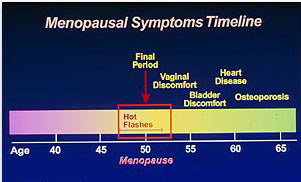Female Hormones



Hormonal Transitions in Women
The hormonal transitions in a woman's life are like a long roller-coaster ride. During adolescence, your ovaries respond to signals from your brain and begin producing the hormones estrogen, progesterone, and testosterone. Soon after, monthly ovulation begins, followed by your menstrual periods if the eggs you produce are not fertilized. For about twenty-five years, from ages 13–40, you are most fertile. After that, for ten to fifteen years, there's a gradual decline in ovarian function and the amount of hormones you produce. This time of declining ovarian function is called the CLIMACTERIC.Eventually, the amount of estrogen and progesterone your ovaries produce is no longer enough to bring on ovulation and keep your monthly periods going. The result: Your periods become irregular; you may experience hot flashes; you may feel moody, less than happy. This one- to three-year period of hormonal flux before your periods stop completely is called perimenopause. The time when your periods finally stop completely (for at least a year) is called menopause.
How mild or severe your menopausal symptoms are depends on how fast your transition to menopause occurs, how much time your body has to adapt to its changing hormones, and how much estrogen your body has from other sources. After menopause, most of your estrogen comes from androgens manufactured by the adrenal glands perched above your kidneys. Your fat and muscle cells convert the androgens to estrogens. The more fat and muscle that you have, the higher the level of non-ovary-produced estrogen. The most commonly reported symptom during this phase of menopause is hot flashes.such as preventing bone loss, but it also has risks. Talk to your healthcare provider about all possible options.

You might go through natural menopause and barely sense the hormonal transition because it is long, smooth, and gentle. Perhaps you have an excess of fat, muscle, or both that is making an alternate supply of estrogen. Or maybe you started menopausal hormone therapy as soon as you experienced menstrual irregularity. Either of these factors might have eased your passage through menopause. But a fair number of you reading this section have experienced menopause in an "unnatural" manner because of your breast cancer diagnosis and treatment.

